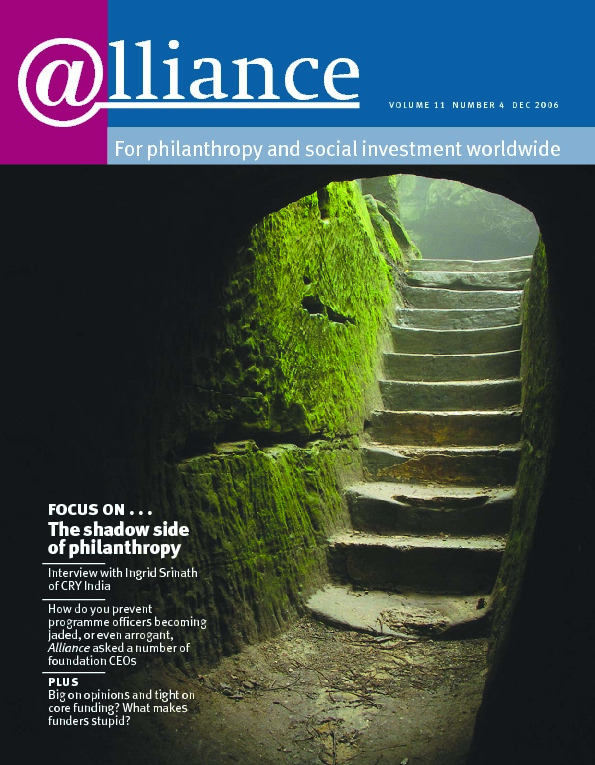Not every reader of Alliance will be familiar with the Ryder Cup, which is a golf match between the best 12 golfers in Europe and America. For years America won it. They had the best players, the best courses, the best clubs; their professionals received millions of dollars, owned private jets, and, in one case, travelled with an attendant chef. Well, this year for the third time in a row the best of Europe has trounced the best of America 18½ points to 9½ points – and even the Achilles of America, Tiger Woods, lost a game.
I long to see the time when philanthropy in Europe can look US philanthropy in the eye and say ‘we are your equals’.
There are of course cultural differences. Europe’s aspiration is different from that of the US, which makes it ironic that we should be content to take instruction about how philanthropy should work, what techniques to use, the role of trustees and so on from the US. Our ‘game’ is not their game.
Let me give two examples from my own experience. First, when I was CEO of CAF, the price of US support in developing the first three community foundations in the UK was our agreement that their main purpose was to attract endowment. Essentially this received wisdom now permeates community foundation development all over Europe, even in countries without wealth.
Self-evidently community foundations are not about means but ends – the involvement of, in this case, wealthy citizens in their communities. Surely a certain flexibility about pass-through funds or funds from the state makes sense?
Second, consider the United Way of America – the ultimate in corporate local involvement (which, like golf, originated in Europe). I have immense admiration for it, but the idea that United Way International has anything to teach mature Europe is wrong – it has succeeded temporarily in Eastern Europe because it came with money, gratefully pocketed, and with US CEOs who wanted to set up businesses there. But just imagine a United Way of Paris. For a start, French CEOs would never dream of persuading their employees that it was their duty to give to charity. Indeed, until quite recently, the concept of organizations muscling in between the state and the citizen was anathema to their political ideal. De Toqueville may be an East Coast hero, but not en France.
Community foundations and United Ways are fine as ideas but not to be sold as total packages or articles of faith like missionaries’ beads. We need to create successful European models of community giving and support. Our models are likely to include more intimate and productive relationships with the state at local level. We don’t need the insensitive proselytising of the community foundation pedagogues nor the missionaries of United Way International.
We want citizens, wealthy and not so wealthy, involved in the future of, say, London or Prague. We also want those at work, with help from employers and the taxman, to become reinvolved in community. This will happen when we in Europe get our game together. We need new ideas, new enthusiasm to create our own 21st century version of the desirable relationship between the state, the citizen and the community.
Europe’s best service to the USA, in philanthropy as in golf, is to do as well as we can do but differently – to create a winning model that challenges their certainties. Just like we seem to have done in the Ryder Cup.
Michael Brophy is Chairman of United Trusts and a Trustee of Capital Community Foundation. Email thebrophys@waitrose.com





Comments (0)